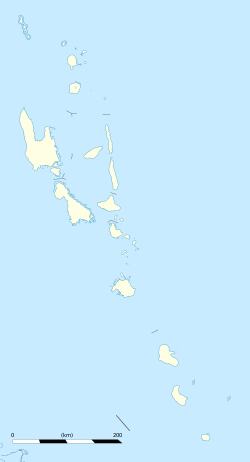Port Havannah
Port Havannah | |
|---|---|
Village | |
| Coordinates: 17°34′8.4″S 168°15′36″E / 17.569000°S 168.26000°E | |
| Country | |
| Province | Shefa Province |
| Island | Efate |
| Time zone | UTC+11 (VUT) |
Port Havannah is a port village on Efate Island in Vanuatu.
History
World War II
With Japanese forces establishing bases on Guadalcanal which threatened the sea route between the U.S. and Australia, Admiral King distributed the joint basic plan for the occupation and defense of Efate on 20 March 1942. Under its terms the US Army was to defend Efate and support the defense of ships and positions. The US Navy's task was: (1) to construct, administer and operate a naval advance base, seaplane base, and harbor facilities; (2) to support Army forces in the defense of the island; (3) to construct an airfield and at least two outlying dispersal fields; (4) to provide facilities for the operation of seaplane-bombers.[1]
On 25 March 1942, the Army sent about 500 men to Efate from Noumea, and the 4th Defense Battalion, 45th Marines, arrived on 8 April. Elements of the 1st Naval Construction Battalion arrived on Efate on 4 May 1942.[1]: 204

Seaplane Base
A detachment of Seebees went north to Havannah Harbour to construct a seaplane base to serve a squadron of PBYs. The Seabees built two seaplane ramps of coral, surfaced with wire mesh, and provided buoys for mooring 14 seaplanes. By 1 June, the PBYs began operating from the new base, bombing the Japanese positions on Guadalcanal. In addition to the ramps and moorings, two small piers, two nose hangars, one 40 feet (12 m) by 100 feet (30 m) seaplane workshop, four 5,000-gallon underground gasoline tanks, and housing facilities for 25 officers and 210 men in quonset huts were constructed.[1]: 205


US Navy units based at the base included:
Havannah Harbour Field
In late 1942 the Seebees constructed a 3,000 feet (910 m) by 180 feet (55 m) fighter airstrip at Port Havannah.[1]: 206
See also
References
- ^ a b c d Building the Navy's Bases in World War II History of the Bureau of Yards and Docks and the Civil Engineer Corps 1940-1946. US Government Printing Office. 1947. p. 202.
 This article incorporates text from this source, which is in the public domain.
This article incorporates text from this source, which is in the public domain.
- ^ Dictionary of American Naval Aviation Squadrons - Volume 2. Naval Historical Center. p. 214.
 This article incorporates text from this source, which is in the public domain.
This article incorporates text from this source, which is in the public domain.

